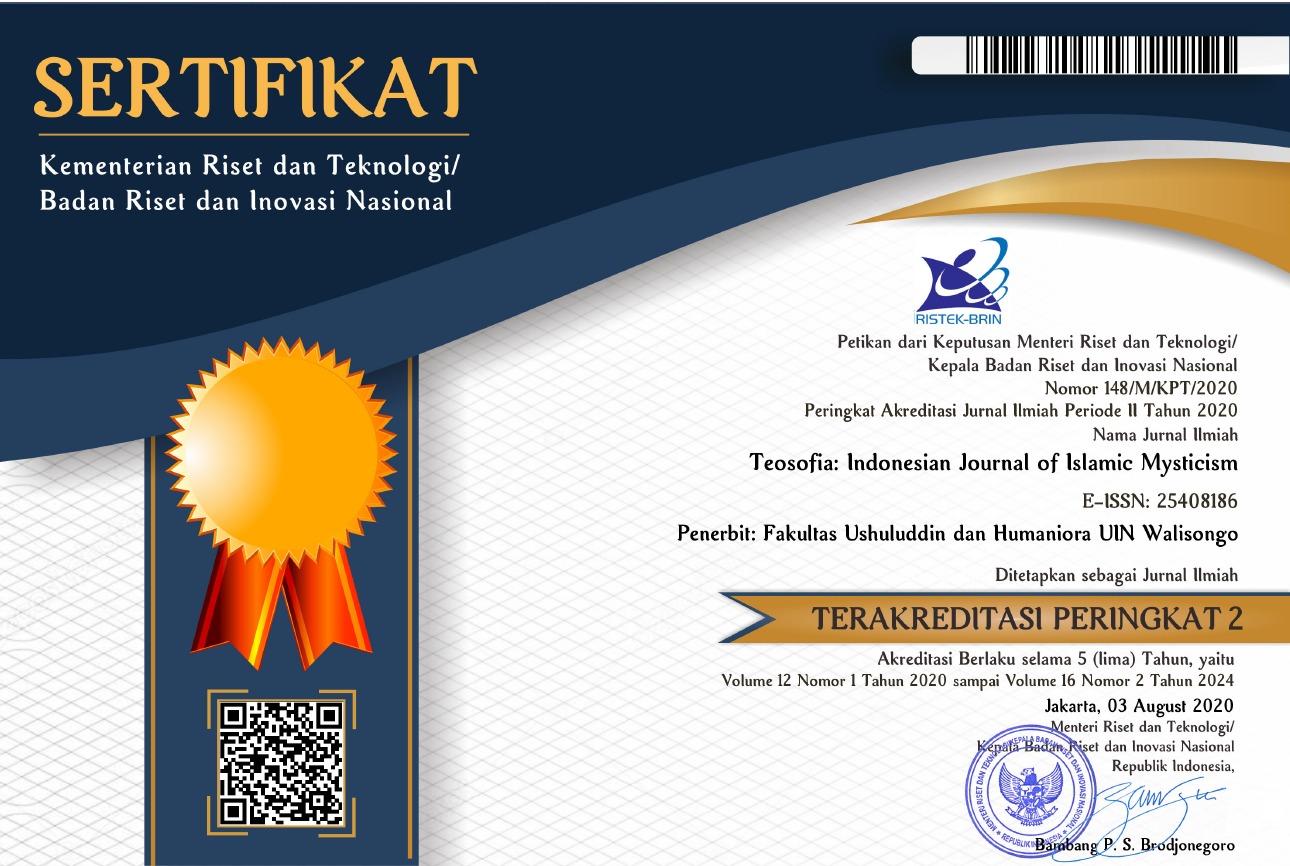Finding God’s Way: Spiritual Well-Being on the People Who Do Tirakat Mlaku
DOI:
https://doi.org/10.21580/tos.v11i1.10721Keywords:
positive psychology, spiritual well-being, tirakat mlakuAbstract
One of the ways to get closer to God is to escape from the world's temptations by going on a journey (safar, mlaku). This study aims to uncover the meaning of spiritual well-being in individuals who perform tirakat mlaku. This article is qualitative research with a phenomenological approach. The subject of this study is the congregation (jemaat) of Sheikh Abdullah Ibn Mas'ud Sukabumi, who perform tirakat mlaku. Data were collected through semi-structured interviews and using interpretive phenomenological analysis. This study found that there are three meanings for those who undergo tirakat mlaku: (1) quality of life, (2) social well-being, and (3) environment well-being. This study also reveals that spiritual well-being is an interrelationship between one's relationship with God, subjective well-being, and socio-environment well-being. This article provides a new perspective on the concept of tirakat as a path to closeness to God, directly affecting the quality of life, social life, and environmental protection.
Contribution: The results of this study can be used as a guide in constructing the dimension of spiritual well-being in the context of Islamic psychological theory. While practically, it provides an outlook of the meanings of divinity that are implemented in social activities.
Downloads
References
Al-Marie, Bambang Khusen. Kajian Serat Wedatama: Kajian Sastra Jawa Klasik. Yogyakarta: Sempulur Publisher, 2018.
Arapova, Elizabeth A., Galina V. Lukyanova, Lyudmila V. Sakharova, and Gurru I. Akperov. ‘Fuzzy-Logic Analysis of the Level of Comfort and Environmental Well-Being of the Urban Environment on the Example of Large Cities of Rostov Region’. In 13th International Conference on Theory and Application of Fuzzy Systems and Soft Computing — ICAFS-2018, edited by Rafik A. Aliev, Janusz Kacprzyk, Witold Pedrycz, Mo. Jamshidi, and Fahreddin M. Sadikoglu, 896:643–50. Advances in Intelligent Systems and Computing. Cham: Springer International Publishing, 2019. https://doi.org/10.1007/978-3-030-04164-9_84.
Aždajić, Dejan. ‘The Doctrine of Tawḥīd and Its Practical Manifestation by a Living Sufi Practitioner’. Teosofia: Indonesian Journal of Islamic Mysticism 10, no. 1 (2021): 1–20. https://doi.org/10.21580/tos.v10i1.7971.
Bahl, Shalini, George R. Milne, Spencer M. Ross, David Glen Mick, Sonya A. Grier, Sunaina K. Chugani, Steven S. Chan, et al. ‘Mindfulness: Its Transformative Potential for Consumer, Societal, and Environmental Well-Being’. Journal of Public Policy & Marketing 35, no. 2 (1 September 2016): 198–210. https://doi.org/10.1509/jppm.15.139.
Bandura, Albert. ‘Self-Regulation of Motivation and Action Through Internal Standards and Goal Systems’. In Goal Concepts in Personality and Social Psychology, edited by Lawrence A. Pervin. London: Psychology Press, 2015. https://doi.org/10.4324/9781315717517.
Breslow, Lester. ‘A Quantitative Approach to the World Health Organization Definition of Health: Physical, Mental and Social Well-Being’. International Journal of Epidemiology 1, no. 4 (1972): 347–55. https://doi.org/10.1093/ije/1.4.347.
Budiarto, Yohanes. ‘Social Well-Being, Psychological Well-Being Dan Emotional Well-Being: Studi Kausal Komparatif Pada Praktisi Seni Bela Diri Bima Dan Kebugaran Fisik’. Jurnal Psikologi 16, no. 1 (2018): 18–28. https://doi.org/10.47007/jpsi.v16i1.26.
Campbell, Angus. The Sense of Well-Being in America: Recent Patterns and Trends. New York: McGraw-Hill, 1981.
Campbell, Angus, Philip E. Converse, and Willard L. Rodgers. The Quality of American Life: Perceptions, Evaluations, and Satisfactions. New York: Russel Sage Foundation, 1976.
Clark, Clayton C., and Jennifer Hunter. ‘Spirituality, Spiritual Well-Being, and Spiritual Coping in Advanced Heart Failure: Review of the Literature’. Journal of Holistic Nursing 37, no. 1 (8 March 2019): 56–73. https://doi.org/10.1177/0898010118761401.
Clench-Aas, Jocelyne, and Arne Holte. ‘The Financial Crisis in Europe: Impact on Satisfaction with Life’. Scandinavian Journal of Public Health 45, no. 18_suppl (29 August 2017): 30–40. https://doi.org/10.1177/1403494817718692.
Cohen, S Robin, Richard Sawatzky, Lara B Russell, Javad Shahidi, Daren K Heyland, and Anne M Gadermann. ‘Measuring the Quality of Life of People at the End of Life: The McGill Quality of Life Questionnaire–Revised’. Palliative Medicine 31, no. 2 (18 February 2017): 120–29. https://doi.org/10.1177/0269216316659603.
El-Qudsy, Abdul Kholiq. ‘Fiqih Safar; Makna Dan Hikmah Yang Terkandung Dibalik Perjalanan’, 2012. https://www.scribd.com/document/89507458/Pedoman-Jaulah-Gamais-2012.
Ellison, Craig W. ‘Spiritual Well-Being: Conceptualization and Measurement’. Journal of Psychology and Theology 11, no. 4 (8 December 1983): 330–38. https://doi.org/10.1177/009164718301100406.
Fisher, John W. ‘Comparing Levels of Spiritual Well-Being in State, Catholic and Independent Schools in Victoria, Australia’. Journal of Beliefs & Values 22, no. 1 (April 2001): 99–105. https://doi.org/10.1080/1361760120039284.
Fumincelli, Laís, Alessandra Mazzo, José Carlos Amado Martins, and Isabel Amélia Costa Mendes. ‘Quality of Life and Ethics: A Concept Analysis’. Nursing Ethics 26, no. 1 (15 February 2019): 61–70. https://doi.org/10.1177/0969733016689815.
Gomez, Rapson, and John W Fisher. ‘Domains of Spiritual Well-Being and Development and Validation of the Spiritual Well-Being Questionnaire’. Personality and Individual Differences 35, no. 8 (December 2003): 1975–91. https://doi.org/10.1016/S0191-8869(03)00045-X.
Harimukthi, Mega Tala, and Kartika Sari Dewi. ‘Eksplorasi Kesejahteraan Psikologis Individu Dewasa Awal Penyandang Tunanetra’. Jurnal Psikologi Undip 13, no. 1 (15 April 2014): 64–77. https://doi.org/10.14710/jpu.13.1.64-77.
Hefferon, Kate, and Elena Gil-Rodriguez. ‘Reflecting on the Rise in Popularity of Interpretive Phenomenological Analysis’. The Psychologist 24, no. 10 (2011): 756–59. https://www.researchgate.net/publication/266911324_Reflecting_on_the_rise_in_popularity_of_interpretive_phenomenological_analysis.
Heintzman, Paul, and Roger C. Mannell. ‘Spiritual Functions of Leisure and Spiritual Well-Being: Coping with Time Pressure’. Leisure Sciences 25, no. 2–3 (April 2003): 207–30. https://doi.org/10.1080/01490400306563.
Helminiak, Daniel A. ‘A Scientific Spirituality: The Interface of Psychology and Theology’. International Journal for the Psychology of Religion 6, no. 1 (January 1996): 1–19. https://doi.org/10.1207/s15327582ijpr0601_1.
Hendriani, Dita. ‘Snouck Hurgronje (1857-1936): Biografi Dan Pemikirannya Tentang Islam Di Indonesia’. Jurnal Widya Citra 1, no. 1 (2020): 54–70. https://doi.org/10.10101/juwitra.v1i1.103.
Irawan, Bambang, Ismail Fahmi Arrauf Nasution, and Hywel Coleman. ‘Applying Ibn ʿArabī’s Concept of Tajallī: A Sufi Approach to Environmental Ethics’. Teosofia: Indonesian Journal of Islamic Mysticism 10, no. 1 (22 April 2021): 21–36. https://doi.org/10.21580/tos.v10i1.7204.
Kahija, YF La. Penelitian Fenomenologis : Jalan Memahami Pengalaman Hidup. Yogyakarta: Kanisius, 2017.
Kaida, Naoko, and Kosuke Kaida. ‘Pro-Environmental Behavior Correlates with Present and Future Subjective Well-Being’. Environment, Development and Sustainability 18, no. 1 (8 February 2016): 111–27. https://doi.org/10.1007/s10668-015-9629-y.
Keshavarzi, Hooman, and Bilal Ali. ‘Islamic Perspectives on Psychological and Spiritual Well-Being and Treatment’. In Islamophobia and Psychiatry, edited by H. Steven Moffic, John Peteet, Ahmed Zakaria Hankir, and Rania Awaad, 41–53. Cham: Springer International Publishing, 2019. https://doi.org/10.1007/978-3-030-00512-2_4.
Keyes, Corey Lee M. ‘Social Well-Being’. Social Psychology Quarterly 61, no. 2 (June 1998): 121–40. https://doi.org/10.2307/2787065.
Mahbub Maulana, Muhammad. ‘Tirakat Ziarah Mlaku Ke Makam Waliyullah : Tinjauan Fenomenologi Terhadap Musafir Di Makam Sunan Kalijaga, Syaikh Kholil Bangkalan Dan Syaikh Syamsuddin Batuampar Madura’. Institut Agama Islam Negeri Walisongo Semarang, 2012.
Muller, Ashley Elizabeth. ‘A Systematic Review of Quality of Life Assessments of Offenders’. International Journal of Offender Therapy and Comparative Criminology 64, no. 13–14 (28 October 2020): 1364–97. https://doi.org/10.1177/0306624X19881929.
Mustofa, Agus. Mengubah Takdir. Surabaya: Padma Press, 2008.
Octari, Tiara Ersha, Bambang Suryadi, and Dian R. Sawitri. ‘The Role of Self-Concept and Health Locus of Control on Quality of Life Among Individuals with Diabetes’. Jurnal Psikologi 19, no. 1 (15 April 2020): 80–94. https://doi.org/10.14710/jp.19.1.80-94.
Seligman, Martin E. P. Authentic Happiness: Using the New Positive Psychology to Realize Your Potential for Lasting Fulfillment. New York: The Free Press, 2002.
Su’udi, Achmad. Bersama Allah Meraih Takdir Baik. Jakarta: QultumMedia, 2009.
Tay, Louis, Mitchel N. Herian, and Ed Diener. ‘Detrimental Effects of Corruption and Subjective Well-Being’. Social Psychological and Personality Science 5, no. 7 (September 2014): 751–59. https://doi.org/10.1177/1948550614528544.
Wijayati, Fitri Laela, and Wahyu Pramesti. ‘How Spiritual Value and Spiritual Wellbeing from Islamic Perspective as an Alternative of Agency Problem’. Journal of Education and Social Sciences 4 (2016): 107–17. https://www.jesoc.com/wp-content/uploads/2016/06/KC4_47.pdf.
World Health Organization. Division of Mental Health. ‘WHOQOL-BREF: Introduction, Administration, Scoring and Generic Version of the Assessment’. Geneva, 1996.
Wu, Shu-Fen, Hong-Yi Tong, Yuen-Yee Kan, Sheng-Hui Su, Meng-Chi Lee, Chia-Chan Kao, and Yu-Hua Lin. ‘The Exploration of Health-Related Quality of Life: Factors Influencing Quality of Life in Gynecologic Cancer Patients’. Clinical Nursing Research 26, no. 1 (25 February 2017): 114–31. https://doi.org/10.1177/1054773815600665.
Downloads
Published
How to Cite
Issue
Section
License
Copyright
The copyright of the received article shall be assigned to the journal as the publisher of the journal. The intended copyright includes the right to publish the article in various forms (including reprints). The journal maintains the publishing rights to the published articles. Therefore, the author must submit a statement of the Copyright Transfer Agreement.*)
Licensing

This work is licensed under a Creative Commons Attribution-ShareAlike 4.0 International License.
In line with the license, authors are allowed to share and adapt the material. In addition, the material must be given appropriate credit, provided with a link to the license, and indicated if changes were made. If authors remix, transform or build upon the material, authors must distribute their contributions under the same license as the original.
_______
*) Authors whose articles are accepted for publication will receive confirmation via email and send a Copyright Transfer Agreement.








